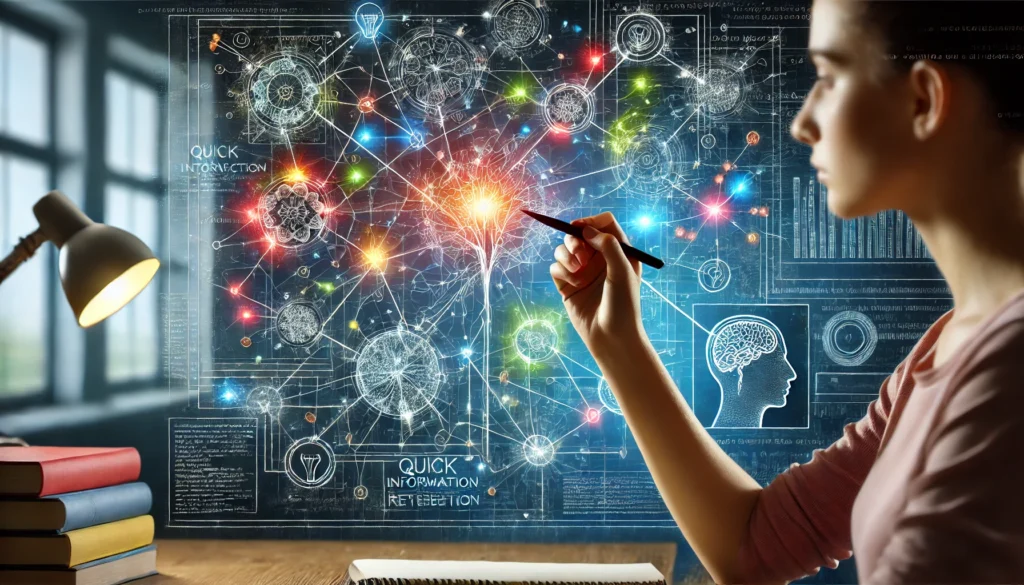The human brain is remarkable in its ability to process and store vast amounts of information. However, many individuals face challenges in retaining this information, especially when under stress or dealing with complex subjects. This is often due to a combination of factors such as the overwhelming volume of material, ineffective study methods, and cognitive overload. To overcome these barriers, it’s essential to adopt techniques that align with how our brains naturally process and remember information.
You may also like: Effective Memory Techniques for Better Studying
Cognitive Overload and Its Impact
Cognitive overload occurs when the brain is overwhelmed with too much information at once. This can lead to decreased learning efficiency and increased frustration. To combat cognitive overload, it is crucial to break down information into smaller, more digestible parts. This approach allows for better concentration and understanding, facilitating more effective learning.
Stress and Information Retention
Stress is a significant barrier to effective information retention. When stressed, the brain’s ability to encode and recall information diminishes. Implementing stress-reduction techniques, such as mindfulness and relaxation exercises, can help mitigate these effects and improve cognitive performance during study sessions.
The Role of Sleep in Memory Formation
Sleep plays a critical role in memory consolidation, where information is transferred from short-term to long-term memory. Lack of adequate sleep can impair this process, making it harder to retain and recall information. Prioritizing restful sleep is essential for optimizing your brain’s ability to store and retrieve knowledge efficiently.
Best Study Methods to Retain Information
Active Engagement
Engagement with the material is one of the most effective ways to retain information. This involves not just passively reading or listening but actively participating in the learning process. Techniques such as summarizing information in your own words, teaching the material to someone else, or creating mind maps can significantly enhance retention. These methods force you to process the information deeply, making it easier to recall later.
Summarizing and Paraphrasing
Summarizing and paraphrasing information in your own words helps deepen understanding and reinforces memory. This method requires you to process the material actively, improving retention. By creating concise summaries, you can distill complex ideas into their essence, making them easier to remember.
Teaching as a Learning Tool
Teaching others is a powerful way to reinforce your own learning. Explaining concepts to someone else requires you to organize your thoughts and understand the material thoroughly. This interaction not only solidifies your knowledge but also highlights areas where you may need further clarification.
Mind Mapping for Visual Learners
Mind maps are visual representations of information that help organize and connect ideas. By creating a mind map, you can see the relationships between different concepts, which aids in memory retention. This technique is particularly beneficial for visual learners who benefit from seeing information laid out spatially.
Spaced Repetition
Spaced repetition is a well-researched technique that involves reviewing information at increasing intervals over time. This method takes advantage of the psychological spacing effect, which suggests that information is more easily remembered when study sessions are spaced out. By revisiting material periodically, you reinforce your memory and improve the likelihood of long-term retention.
The Spacing Effect Explained
The spacing effect describes how information is better remembered when study sessions are spaced apart rather than crammed together. This approach allows for repeated exposure to the material over time, strengthening memory pathways. Understanding this effect can help you structure your study sessions for maximum retention.
Tools and Apps for Spaced Repetition
Numerous digital tools and apps are available to help implement spaced repetition techniques effectively. These platforms often use algorithms to determine optimal review times, ensuring information is revisited before it is forgotten. By leveraging technology, you can streamline your study process and enhance retention.
Creating a Spaced Repetition Schedule
Developing a personalized spaced repetition schedule can help you manage study sessions effectively. By planning when to review material, you can ensure consistent exposure to information, aiding in long-term memory retention. Tailoring your schedule to your learning needs enhances efficiency and effectiveness.
Mnemonic Devices
Mnemonic devices are tools that help you remember information through associations. This can include acronyms, visualization, and rhymes. For instance, associating complex health concepts with vivid imagery can make them easier to recall. Creating a story or a narrative around the information can also be a powerful mnemonic technique.
Visualization Techniques
Visualization involves creating mental images to represent information. This method can make abstract concepts more tangible and easier to recall. By associating information with vivid imagery, you create a mental “snapshot” that aids in memory retention.
Acronyms and Acrostics
Acronyms and acrostics are mnemonic devices that use the first letters of words to create memorable phrases. These tools simplify complex information, making it easier to remember. By crafting creative acronyms, you can transform lists and sequences into easily recalled units.

Storytelling as a Mnemonic Tool
Storytelling involves weaving information into a narrative, making it more engaging and memorable. This approach allows you to connect disparate pieces of information through a coherent storyline. By crafting a story around concepts, you can improve recall and understanding.
How to Retain Information Quickly
Chunking Information
Chunking is the process of breaking down large amounts of information into smaller, manageable units. This technique is particularly useful when studying complex subjects. By grouping related information together, you create meaningful connections that facilitate easier recall. For example, when learning about different health strategies, you might chunk information into categories like nutrition, exercise, and mindfulness.
Categorizing Information for Better Recall
Organizing information into categories allows for easier retrieval from memory. By grouping similar concepts together, you create a structured framework that aids in recall. This method simplifies complex subjects and enhances understanding.
The Science Behind Chunking
Chunking leverages the brain’s natural ability to recognize patterns and group related items. This process reduces cognitive load and improves memory retention. Understanding the science behind chunking can help you apply this technique more effectively in your studies.
Practical Applications of Chunking
Chunking can be applied in various contexts, from academic study to everyday tasks. By breaking down information into smaller units, you can enhance focus and comprehension. This approach is particularly beneficial when learning dense or unfamiliar material.
Utilizing Multisensory Learning
Incorporating multiple senses into your learning process can enhance memory retention. This approach, known as multisensory learning, involves using visual, auditory, and kinesthetic elements to reinforce information. For instance, you might listen to a podcast on holistic health while taking notes or watch a video demonstration of a wellness practice. Engaging multiple senses creates a richer learning experience and strengthens memory pathways.
The Benefits of Multisensory Learning
Multisensory learning engages different parts of the brain, creating a more robust neural network for information retention. By involving multiple senses, you can reinforce memory pathways and improve recall. This approach caters to diverse learning styles and enhances overall comprehension.
Techniques for Multisensory Learning
There are various techniques to incorporate multisensory elements into your study routine. These include combining visual aids with auditory explanations, using hands-on activities, and integrating physical movement. By experimenting with different methods, you can find the most effective approach for your learning style.
Adapting Multisensory Learning to Different Subjects
Multisensory learning can be adapted to suit a wide range of subjects and topics. Whether studying sciences, languages, or arts, you can tailor multisensory techniques to enhance understanding and retention. This flexibility makes it a valuable tool in any educational setting.
Mindfulness and Focus
Practicing mindfulness can improve your ability to focus and retain information. Mindfulness involves being fully present and engaged in the moment, which can reduce distractions and enhance concentration. Techniques such as deep breathing, meditation, and mindful breaks during study sessions can help clear your mind and prepare it for effective learning.
The Connection Between Mindfulness and Memory
Mindfulness practices can enhance memory by improving attention and reducing cognitive interference. By cultivating awareness, you create a mental environment conducive to learning. This connection highlights the importance of integrating mindfulness into study routines.
Mindfulness Techniques for Students
Students can benefit from various mindfulness techniques, such as meditation, focused breathing, and mindful movement. These practices help calm the mind, reduce stress, and improve concentration. By incorporating mindfulness into daily routines, students can enhance their learning capabilities.
Creating a Mindful Study Environment
A mindful study environment is free from distractions and designed to promote focus. Elements such as comfortable seating, minimal noise, and organized materials contribute to a conducive learning space. By creating an environment that supports mindfulness, you can optimize your study sessions.
Practical Tips for Students and Adults
Developing a Study Routine
Establishing a consistent study routine can train your brain to focus more effectively. Allocate specific times for studying each day, and stick to this schedule to build a habit. Ensure your study environment is free from distractions and equipped with all necessary materials. A well-structured routine can enhance your ability to process and retain information.
The Importance of Consistency
Consistency in studying reinforces habits and enhances learning efficiency. By sticking to a regular schedule, you signal to your brain that it’s time to focus and absorb information. This consistency contributes to long-term retention and academic success.
Designing a Productive Study Environment
A productive study environment is essential for effective learning. This space should be quiet, comfortable, and free from distractions. Organizing your materials and minimizing clutter can help create a focused atmosphere conducive to study.

Balancing Study and Breaks
Balancing study sessions with breaks is crucial for maintaining focus and preventing burnout. Implementing techniques such as the Pomodoro Technique can help manage time effectively. By taking regular breaks, you can recharge your mind and sustain concentration.
Addressing Cognitive Load
Cognitive load refers to the amount of mental effort required to process information. To manage cognitive load, prioritize key concepts and focus on understanding them thoroughly before moving on to additional material. This approach prevents overwhelm and allows you to build a solid foundation of knowledge.
Strategies to Reduce Cognitive Load
Reducing cognitive load involves simplifying information and focusing on core concepts. Techniques such as summarization, chunking, and visualization can help manage mental effort. By streamlining your study approach, you can enhance learning efficiency.
The Role of Prior Knowledge
Prior knowledge plays a significant role in managing cognitive load. Building on existing understanding allows for easier integration of new information. By connecting new material to what you already know, you can reduce cognitive load and improve retention.
Adapting to Individual Learning Needs
Adapting study methods to individual learning needs can help manage cognitive load effectively. Recognizing personal strengths and weaknesses allows for tailored learning strategies. This personalized approach enhances understanding and retention.
Implementing Health and Wellness Strategies
Incorporating health and wellness strategies into your lifestyle can support cognitive function and information retention. Regular exercise, a balanced diet, and adequate sleep are crucial for brain health. Additionally, practices such as yoga and meditation can reduce stress and improve mental clarity, creating an optimal environment for learning.
The Impact of Nutrition on Learning
Nutrition plays a vital role in cognitive function and memory. Consuming a balanced diet rich in essential nutrients supports brain health and enhances learning capabilities. By prioritizing nutrition, you can optimize your brain’s ability to process and retain information.
Exercise and Cognitive Performance
Regular physical activity is linked to improved cognitive performance and memory retention. Exercise increases blood flow to the brain, promoting neural growth and connectivity. By incorporating exercise into your routine, you can enhance your ability to learn and remember information.
Stress Management for Better Learning
Effective stress management is crucial for maintaining mental clarity and focus. Techniques such as yoga, meditation, and deep breathing can reduce stress and improve cognitive performance. By managing stress, you create a mental environment conducive to effective learning.
Conclusion: Enhancing Your Information Retention Abilities
Improving your ability to retain information is a journey that requires dedication and the right techniques. By understanding how your brain processes information and implementing effective study methods, you can enhance your cognitive abilities and achieve your learning goals. Whether you’re a student, a health enthusiast, or someone seeking to improve personal wellbeing, these strategies offer practical solutions to the challenges of information retention. By adopting a holistic approach that includes active engagement, spaced repetition, and mindfulness, you’ll be well-equipped to retain knowledge quickly and efficiently.
Committing to Lifelong Learning
Embracing lifelong learning involves continually seeking new knowledge and skills. This mindset fosters intellectual growth and adaptability. By committing to ongoing education, you can enhance your cognitive abilities and remain intellectually engaged throughout life.
Evaluating and Adapting Your Strategies
Regularly evaluating and adapting your learning strategies ensures they remain effective and relevant. Being open to experimentation and change allows you to refine your approach and enhance retention. By staying flexible, you can optimize your learning process.

Celebrating Your Achievements
Acknowledging and celebrating your learning achievements can boost motivation and reinforce positive habits. Recognizing progress encourages continued effort and commitment to personal growth. By celebrating milestones, you can maintain enthusiasm for your learning journey.
Further Reading:
Why Can’t I Retain Information? 14 Ways To Fix Your Memory Fast
12 Learning Strategies to Help You Retain Information Fast
Important Note: The information contained in this article is for general informational purposes only, and should not be construed as health or medical advice, nor is it intended to diagnose, prevent, treat, or cure any disease or health condition. Before embarking on any diet, fitness regimen, or program of nutritional supplementation, it is advisable to consult your healthcare professional in order to determine its safety and probable efficacy in terms of your individual state of health.
Regarding Nutritional Supplements Or Other Non-Prescription Health Products: If any nutritional supplements or other non-prescription health products are mentioned in the foregoing article, any claims or statements made about them have not been evaluated by the U.S. Food and Drug Administration, and such nutritional supplements or other health products are not intended to diagnose, treat, cure, or prevent any disease.


